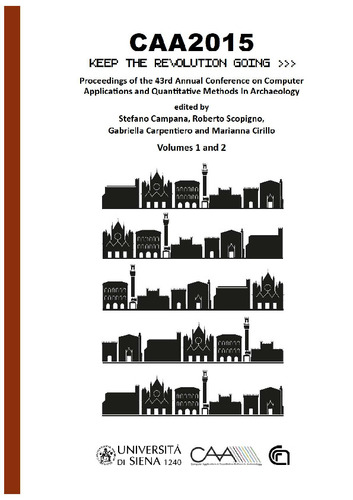3D technology applied to quantification studies of pottery: Eve 2.0
Autor(es) y otros:
Editor/Coord./Trad.:
Palabra(s) clave:
Methodology
Quantification
Pottery
Estimated Vessel Equivalent
·D technology
Cerámica
Arqueología
Cuantificación
Metodología
EVE
Fecha de publicación:
Editorial:
Archaeopress Archaeology
Descripción física:
Resumen:
In archaeological excavations, pottery fragments are the most common remains. As a consequence, it seems appropriate to propose a methodology that can help in their study. Therefore, we intend to propose a method that will alow us to identify from a fragment of pottery, the size of the vessel it came from, basing on partially completed pieces. This approach is not new, since between the 1980s and 1990s, C. Orton, P. Tyers and A. Vince started discussing about the estimated vessel equivalent (EVE). However, despite its advantages, it is a system which is not fully implemented . On this basis, we have designed a reviewed EVE, adapted to the new technologies (3D) that allow us to go further and talk of EVE 2.0.
In archaeological excavations, pottery fragments are the most common remains. As a consequence, it seems appropriate to propose a methodology that can help in their study. Therefore, we intend to propose a method that will alow us to identify from a fragment of pottery, the size of the vessel it came from, basing on partially completed pieces. This approach is not new, since between the 1980s and 1990s, C. Orton, P. Tyers and A. Vince started discussing about the estimated vessel equivalent (EVE). However, despite its advantages, it is a system which is not fully implemented . On this basis, we have designed a reviewed EVE, adapted to the new technologies (3D) that allow us to go further and talk of EVE 2.0.
Descripción:
CAA, Annual Conference on Computer Applications and Quantitative Methods in Archaeology (43. 2015. Siena)
ISBN:
Patrocinado por:
Vicerrectorado de Investigación y Campus de Excelencia Internacional de la Universidad de Oviedo. Programa “Severo Ochoa” de Ayudas Predoctorales (FICYT), Universidad de Oviedo.
Colecciones
Ficheros en el ítem





